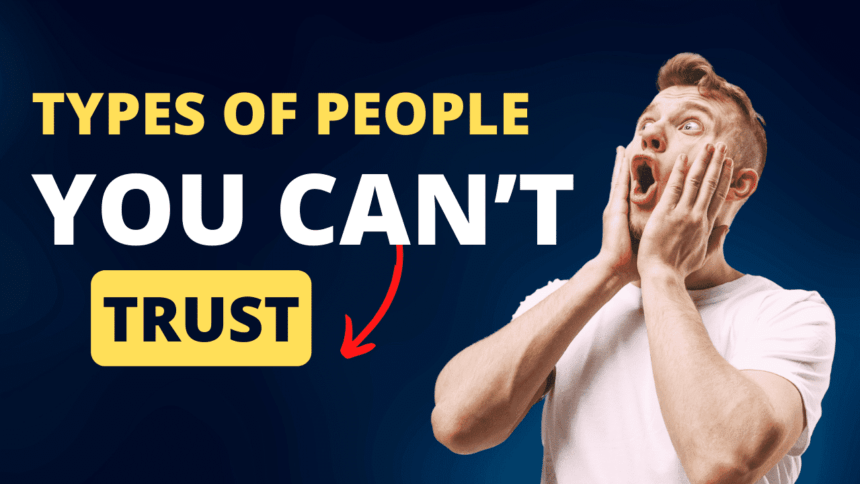Discover the kinds of people you can rely on and learn how to handle relationships with wisdom. Unearth the signals, causes, and tactics for managing untrustworthy individuals.
Introduction
Navigating the complex network of human connections can be tough, especially when you come across people you can’t rely on. This complete guide explores the details of recognizing, understanding, and handling individuals who may not have your best interests at heart. From spotting subtle signals to creating effective strategies for self-protection, this article is your guide to preserving your trust in a world where not everyone is reliable.
1: You can’t trust a person who disguises insults as jokes
Their words may seem lighthearted on the surface, but underneath lies a venomous intent. It’s a betrayal of trust to be on the receiving end of such disguised malice, and it leaves a lingering sense of hurt and doubt. Trust is built on honesty and respect, and when someone uses humour as a shield for their cruelty, it shatters the foundation of trust. It’s a painful realization that the person you thought was a friend is capable of inflicting emotional harm under the guise of laughter. It’s a reminder to be cautious of those who use humour as a weapon and to surround yourself with people who uplift and support you genuinely.
2: You can’t trust a person who will never take accountability but has no problem always blaming you.
It can be tough to trust someone who never takes responsibility for their actions and is quick to blame others. It can feel like you’re always being unfairly targeted and misunderstood. It’s important to surround yourself with people who are willing to take accountability and work towards understanding and resolving conflicts. You deserve to be in relationships where both parties are willing to take responsibility and work towards mutual understanding and growth. It’s okay to set boundaries and prioritize your well-being in these situations.
3: You can’t trust a person who says they want the best for you but then gives you backhanded insults or passive-aggressive remarks.
It hurts when someone you care about says they have your best interests at heart, but their words hurt more than if they were openly hostile. The sting of a backhanded compliment or a passive-aggressive remark can stay with you long after the conversation is over, leaving you feeling unsure and upset. It feels like a betrayal of trust when someone acts as if they care but they’re being mean, and it destroys the foundation of a real connection. Trust is supposed to be based on honesty and support, so when someone hides their true feelings behind a facade of concern, it breaks the fragile trust that was there. It’s a reminder to be careful of people who say they have your best interests at heart but their words tell a different story. Surround yourself with people who genuinely lift you and encourage you, because they are the ones who deserve your trust and love.

Also, read 8 ways you can beat overthinking like a Pro
4: You can’t trust a person whose words and actions don’t match. (if they say they care for you but act like they don’t believe their actions.)
It’s often said that actions speak louder than words, and it’s a sentiment that holds true in every aspect of life. When someone’s words and actions don’t align, it’s hard to trust them. It’s like trying to hold onto a handful of sand – the tighter you grip, the more it slips through your fingers. It’s a heartbreaking realization when you come to understand that someone you care about isn’t being honest with you. It’s like a betrayal of the heart, and it leaves you feeling lost and confused. Trust is the foundation of any meaningful relationship, and when that trust is broken, it can feel like the ground beneath you has given way. It’s a painful lesson to learn, but it’s a reminder to always pay attention to the way people behave, not just the way they speak. Because in the end, it’s the actions that truly reveal a person’s character.
5: You can’t trust a person who puts seeds of doubt in you, disguised as something else, like concern for you.
It’s tough when someone you care about claims to have your best interests at heart, but their words and actions leave you feeling uncertain and insecure. It’s like a betrayal of trust because you want to believe that they genuinely care for you, but their subtle jabs and disguised criticisms make you question their intentions. It’s a painful realization that the person you thought had your back is planting seeds of doubt in your mind. It’s a reminder to be cautious of those who use concern as a mask for their hidden agendas and to seek out those who offer genuine support and encouragement. Trust is built on honesty and sincerity, and it’s important to surround yourself with people who uplift and empower you without hidden motives.
also read: 6 Brutally Honest Truths About Life
6: People You Can Not Trust: A Closer Look
The Smooth Talker
Meet the smooth talker, they’re good at convincing people. Get to know the charm that hides their real motives, so you can tell if they’re being genuine or just sweet-talking.
The Opportunist
Opportunists are always trying to take advantage of situations for their benefit, even if it means not caring about how it affect others. You should know how to spot this kind of behaviour and figure out ways to keep yourself from getting caught up in their plans.
The Chronic Liar
The chronic liar is someone who habitually tells lies, whether big or small and often does so without any apparent reason. This behaviour can be damaging to relationships and can lead to a lack of trust from others. It may also stem from deeper psychological issues that need to be addressed.
The Fair-Weather Friend
The fair-weather friend is someone who is only there for you when times are good and disappears when you need them the most. They may seem supportive and caring during good times, but their true colours show when things get tough. This type of friend is unreliable and can be harmful to your well-being.
be careful my friend: not everyone who smiles at you is your friend
FAQs
Q: How can I identify deceptive behaviour in someone?
A: Keep an eye out for any weird stuff – like if what they’re saying doesn’t match up with what they’re doing, or if their body language seems off. And most importantly, trust your gut if something just doesn’t feel right.
Q: Are all smooth talkers untrustworthy?
A: Not really, but it’s important to be careful. Some people can talk a good game to cover up their real intentions, so make sure to watch what they do.
Q: Can chronic liars change their behaviour?
A: While change is doable, you just gotta be aware of yourself and be real. Having your friends or some pros on your side can help out.
Q: Is it possible to mend trust after betrayal?
A: Rebuilding trust takes time, open communication, and genuine remorse from the betrayer. It’s a challenging process but not impossible.
Q: How do I set effective boundaries with untrustworthy individuals?
A: Communicate your expectations, be firm in enforcing boundaries, and prioritize your well-being over accommodating their behaviour.
Q: What role does forgiveness play in dealing with untrustworthy people?
A: Forgiveness can be a personal choice, but it’s essential to prioritize self-protection. Forgiveness doesn’t always mean re-establishing trust.










